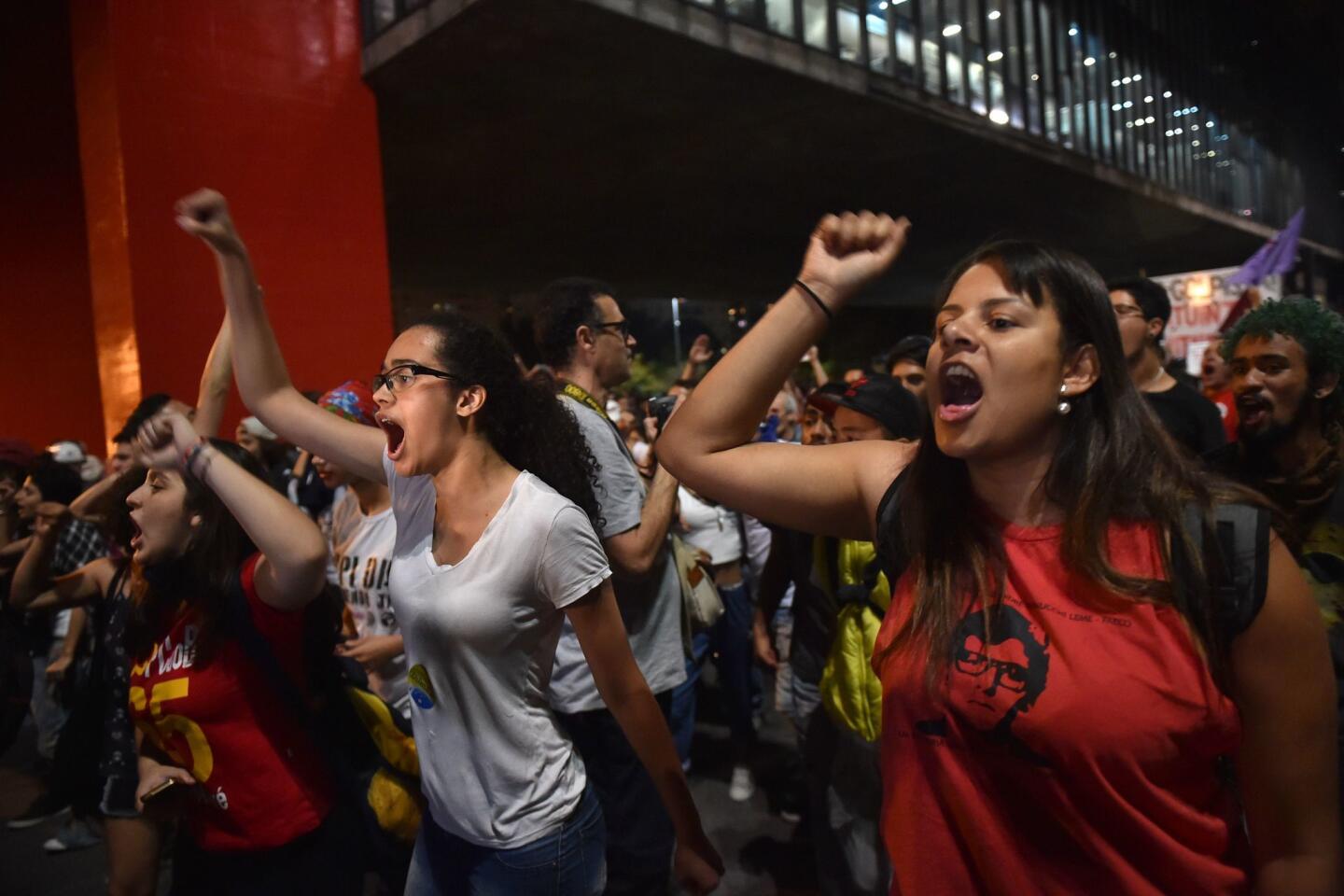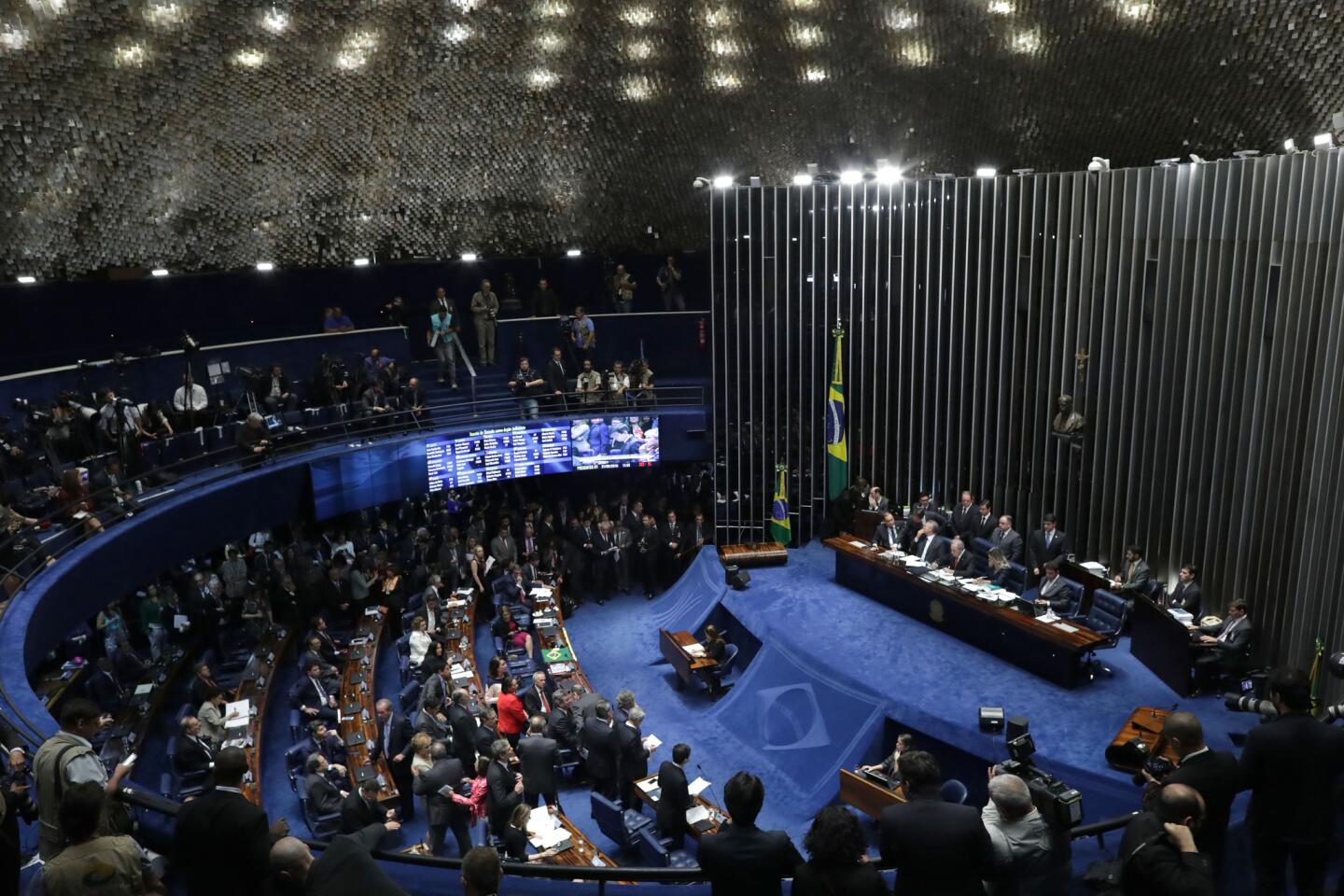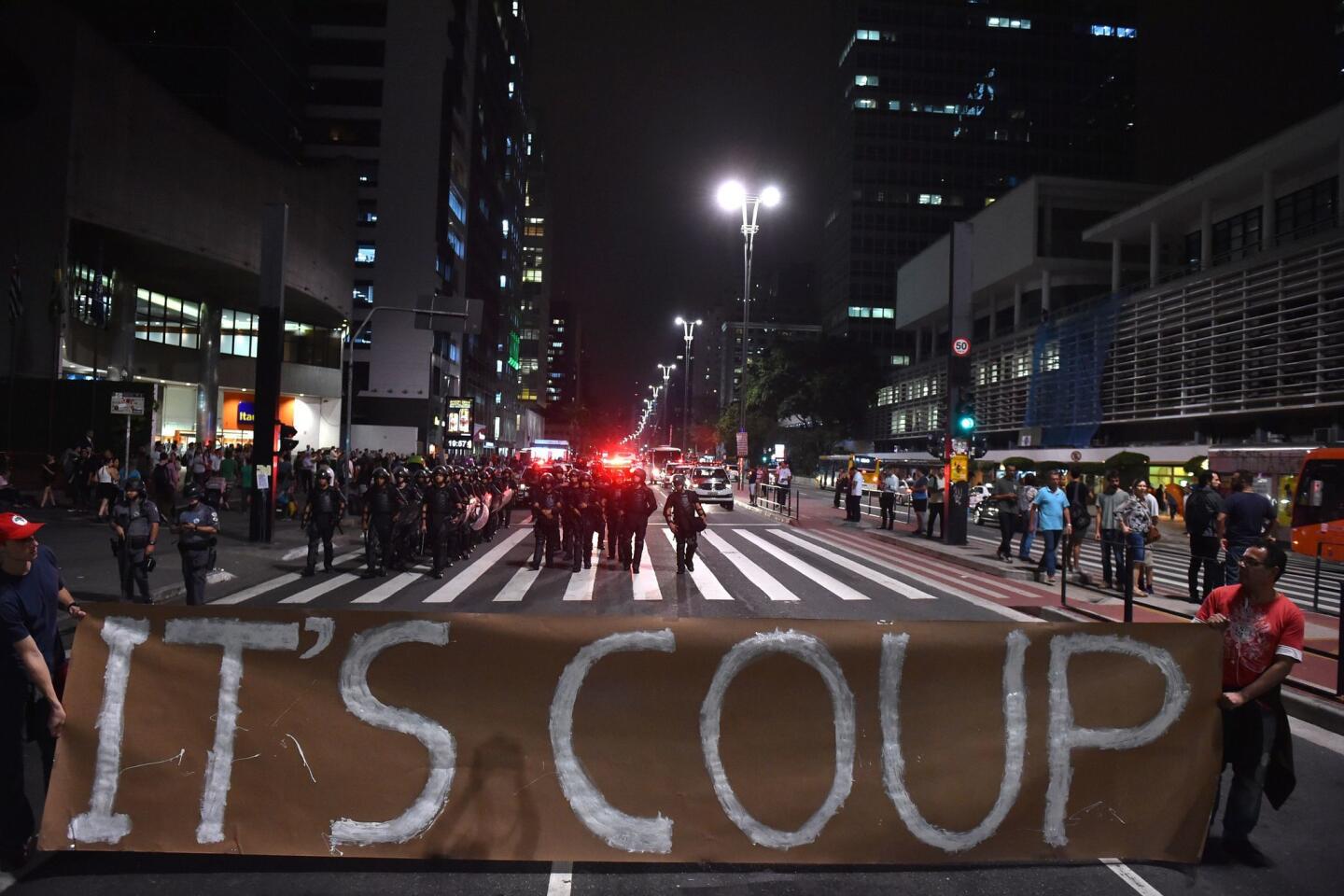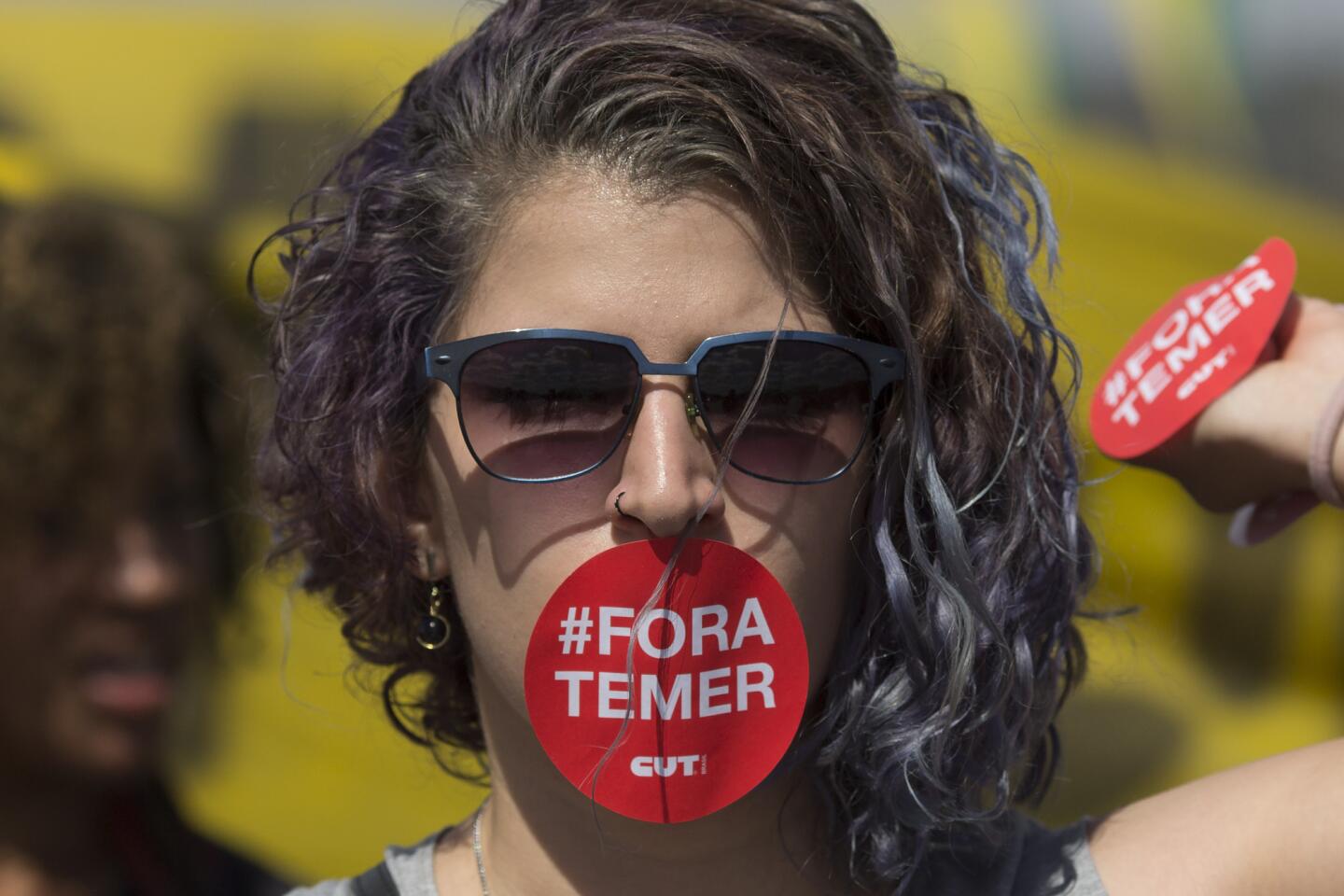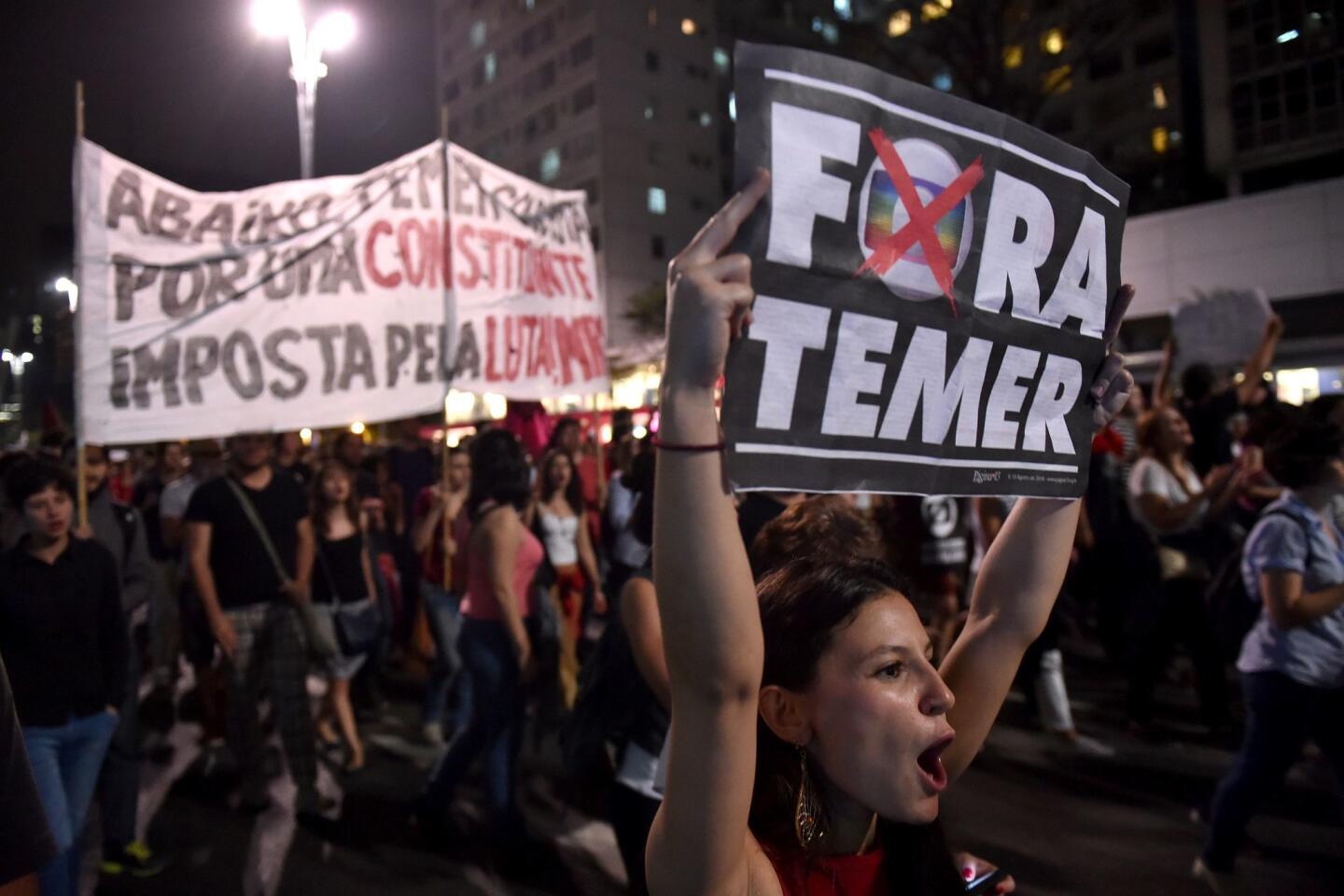Brazilâs Senate ousts President Dilma Rousseff from office
Reporting from Rio de Janeiro â After months of bitterly contested proceedings, Brazilâs Senate voted overwhelmingly on Wednesday to remove President Dilma Rousseff from office, marking a turbulent finale to 13 years of center-left government in Latin Americaâs largest country.
Rousseff, a onetime guerrilla turned economist and the nationâs first female president, was convicted on a vote of 61 to 20 of breaking fiscal responsibility law. Brazilâs more conservative Vice President Michel Temer will serve out the rest of her term, which expires in 2018.
The impeachment vote came as no surprise âsenators had signaled their intentions. Still, it rocked a nation that, after basking in the worldâs attention during this monthâs Olympics, continues to be saddled by a crippling recession, an ongoing investigation into widespread corruption and a crisis of confidence in the political system.
Soon after the final vote, Rousseff descended to the lobby of the presidential palace in Brasilia and gave a defiant speech to supporters, transmitted live on Facebook.
âThe senators who voted for impeachment decided to rip up the constitution ⌠they condemned an innocent person and carried out a parliamentary coup,â said Rousseff, who was surrounded mostly by women and vowed to appeal the decision.
âThey think they won, but theyâre wrong. I know we will all fight,â she said. Rousseff then ended by quoting a poem written by Soviet-era Russian artist Vladimir Mayakovsky, and left to shouts of âOut with Temer!â â a chant often heard during Olympic competitions.
Itâs unclear if an appeal has any chance of success, but Rousseffâs attorney, former justice minister Jose Eduardo Cardozo, is already considering arguments he can bring to the Supreme Court.
Over the last few days, as Rousseff emphatically protested her innocence and protesters in some cities clashed with police and fires blocked main arteries, but the demonstrations were smaller than those that called for her ouster earlier this year and led to her temporary suspension in May.
âI was no fan of Rousseffâs government. It made serious mistakes. But at least she was elected legitimately,â said Michelle Brito, 33, who attempted to join a protest against Temerâs new government near her work Tuesday night in Sao Paulo, Brazilâs largest city, before being turned away by tear gas, explosions, and crowds running from police.
âI believe the men who took over did so cynically and with the worst intentions,â Brito said. âThey wanted to take power without having to face democracy, and I fear now for how we may suffer.â
How the rest of Latin America will react is unclear, but so far, Venezuela, Bolivia and Ecuador have said they will recall their ambassadors from Brazil.
Though polls showed a majority of Brazilians wanted Rousseff out before the impeachment process started, a majority also wanted to remove Temer. Brazilians vigorously booed him during the recent opening ceremony of the Rio Olympics.
Recent polling suggests a majority preferred new elections and only half the country believed impeachment was being carried out in full accordance with the law. The Supreme Court, however, allowed the Senate to decide if Rousseffâs offenses merited impeachment, and much of the countryâs political and business elite has been united around the idea of a permanent Temer government for months.
Temer, who turned on Rousseff to support impeachment, formed an alliance with parts of her coalition as well as the party that lost the 2014 election. He cannot run for president in 2018 because he has been convicted of breaking campaign finance rules and banned from running for office. The two men behind him in line for the presidency have been accused of corruption, while Rousseff has not. Technically, she was accused of shifting public funds to mask federal deficits.
Temerâs new administration surprised Brazilians in May when he steered the country sharply to the right and installed a new Cabinet made up of entirely white men in a country that is minority white, then three of his new ministers immediately had to resign amid corruption accusations unearthed in the countryâs sprawling âCar Washâ corruption probe.
Temer, who has served as âinterimâ president since Rousseff was suspended in May, will now be granted full powers, but may nevertheless face an uphill battle to establish popularity and get the economy back on track.
âItâs going to be a difficult period for Brazilâs economy under Temer, and it would have been difficult under Rousseff. Even if Temer survives [until 2018] and is relatively successful, we donât expect him to be very popular,â says Joao Augusto de Castro Neves, Latin America Director at the Eurasia Group in Washington.
Despite the lack of consensus as to whether this the right way to remove Rousseff, he added, âfew governments in the world would have survived this perfect storm of political factors. Rousseff lost political support, the country faces a severe recession, and there is an ongoing, massive corruption scandal.â
Out of the last four presidents elected in Brazil, Rousseff is the second to depart office early. In 1992, President Fernando Collor resigned before facing impeachment. This may be the first time since the fall of Brazilâs dictatorship in the 1980s that a significant portion of the population questions the democratic legitimacy of its leader.
The final moments of the lengthy impeachment proceedings offered moments of high drama that captured the attention of the country just after the spectacle of the Rio Games.
On Monday, Rousseff took the stand for 14 hours, defending herself emphatically during questioning after reminding the country of the torture she suffered as a revolutionary under Brazilâs dictatorship and said conservatives elites had conspired to overthrow her election and threaten democracy.
âWhat is at stake here is not just my presidency,â Rousseff said then. âWhat is at stake is the principle of respect for the ballot box, the sovereign will of the Brazilian people, and the constitution.â
The proceedings were marked by impassioned and angry speeches and, in some cases, tears.
On Tuesday, lawyer Janaina Paschoal, who co-authored the articles of impeachment, began to weep and asked Rousseffâs forgiveness for the suffering Paschoal had caused her. But she did so, she said, thinking about the nationâs future and Rousseffâs grandchildren.
Among those voting to convict Rousseff was Collor, who now serves in the Senate. He was stripped of his political rights for eight years after he resigned the presidency, and on Wednesday he stood to ask the Senate to simultaneously ban Rousseff from holding any public office.
The Senate surprised analysts by voting on that issue separately, and chose not to temporarily strip Rousseff of her rights.
âThat was surreal. Because if she is actually guilty of an impeachable crime, then she should then have been stripped of her political rights, as was the case with Fernando Collor,â said Mauricio Santoro, a political scientist at Rio de Janeiro State University.
âIâm trying to understand what led to this, if there may have been some backroom deal,â Santoro said. âThis means that if she wants to, Rousseff could try to return as a member of Congress, which would be an even more potent possibility if Temer is seen as a failure.â
In the final moments before the vote, Lindbergh Farias, from Rousseffâs Workersâ Party, and Vanessa Grazziotin, who represents the Communist Party of Brazil in the state of Amazonas, took the stage to deliver fiery denouncements of the process.
âScoundrels, scoundrels, scoundrels!â boomed Farias. âHistory will not forget this day. You will all end up in the dustbin of history,â he said.
Grazziotin then added, âItâs true that Rousseff momentarily lost popularity, and she admits this. The Brazilian people went into the streets. But they didnât go into the streets to ask for Temer, and they didnât go into the streets to put a stop to corruption allegations.â
Secretly recorded conversations leaked after Rousseff was suspended in May suggested that some politicians voted to oust her in order to stop corruption inquiries. She had never held elected office before become president, and, despite enjoying high levels of popularity for a few years, lost support among traditional political elites as the country took a nosedive.
âRousseff had to go, I suppose. She ruined the economy,â said Jose Teixeira Magalhaes, 46, who works selling snacks in a Sao Paulo subway station. âBut is this going to solve our problems? Not even close. All the men who are taking over for her are corrupt. The whole political class is corrupt.â
Bevins is a special correspondent.
MORE:
Brazilian President Dilma Rousseff: My impeachment threatens democracy
Brazilâs current and former presidents face trials. And the interim president is in hot water too
U.S. Congress members express âdeep concernâ over threats to democracy in Brazil
UPDATES:
2:15 p.m.: This article was updated with reaction from some of Brazilâs neighbors, additional details of the impeachment proceedings and comments from political scientist Mauricio Santoro and Sao Paulo snack vendor Jose Teixeira Magalhaes.
12:15 p.m.: This article was updated with Dilma Rousseff declaring she will fight her impeachment.
9:50 a.m., Aug. 31: This article was updated with Brazilâs Senate voting to remove President Dilma Rousseff from office.
This article was originally published at 7:15 p.m., Aug. 30
More to Read
Sign up for Essential California
The most important California stories and recommendations in your inbox every morning.
You may occasionally receive promotional content from the Los Angeles Times.
